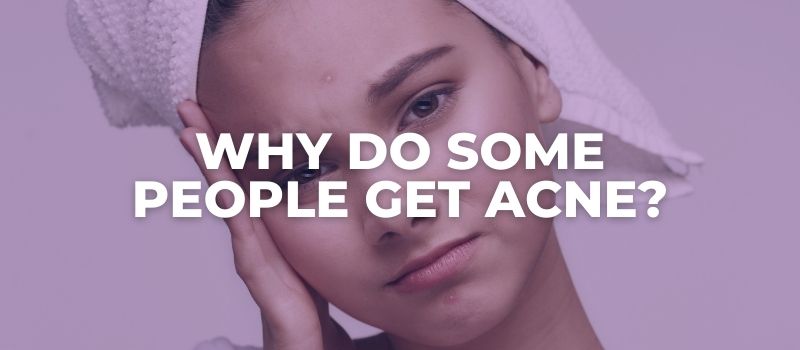Can you just feel the frustration in this question?
It’s no secret that most people are affected by acne at one time or another in their life.
In fact, 80% of the population gets these weird spots, pimples, or the most severe cystic breakouts, while the rest of the population is just pouncing around acne-free in what almost feels like “rubbing it in our face” kinda thing.
You have probably heard that things like hormones, diet, stress, hygiene, or lifestyle choices may lead to having acne and this is only partially true.
Not everybody gets acne no matter what they eat, how they live, are they washing their skin, do they masturbate or not, are they eating healthy food, etc.
So, let’s dive into this article and explain…
Why Do Some People Get Acne & Some Don’t?

Many factors can contribute to acne formation and this can indeed include hormones, lifestyle choices, hygiene, diet, etc.
However, this is a difficult question to answer without the background to work with. And by this, I mean that not everyone experiences the same circumstances that might be a potential acne trigger and it varies drastically from person to person.
As an esthetician, I get this question more regularly than you’d think, however, I always want to get informed on the client’s back story before I can recommend adequate treatment.
For example, do they live their daily lives in a stressful environment, how often do they wash their face, what are the products they are using, what does their diet consist of, etc.
Hormones, for example, can indeed play a role in triggering acne. Androgens, in particular, increase during puberty and this contributes to the oil glands becoming larger and making more sebum.
So this explains why most people get more acne during puberty.
Additionally, the hormone that’s known as cortisol or the “stress hormone” is known to also rev up the activity of sebaceous glands in the skin, leading to higher than normal levels of oil production.
Excessively greasy or sugary foods can also have a side effect on the oil glands, increasing oil production.
Not washing your face regularly, oh well, that pretty much speaks for itself now does it?
Additionally, genetics may also matter and chances are that if your parents had acne in their youth, you may have inherited that tendency, too.
What Is The Main Cause Of Acne?
The exact cause of acne is a simple one: it all starts with a clogged pore.
No matter how small and insignificant or how severely inflamed your acne is, it all starts with a simple clog.
Acne develops when the pores on your skin become clogged with excess sebum and a mixture of accumulated dead skin cells, white blood cells, and bacteria buildup.
Your skin has small passages known as pores. Every single pore is an opening to a follicle and the follicle is made up of a single hair and a sebaceous gland.
The sebaceous gland releases an oily substance known as sebum which travels up and out of the pore and it then remains onto your skin to keep it moisturized and lubricated.
Now, this oily film is what keeps that skin soft and protected from external aggressors. It has mild bactericidal properties and it is on the acidic side of the pH scale, which is the oilier side in simple terms.
The mixture of dead skin cells and overgrowth of the bad strain of the acne-causing bacteria block the pores and prevent sebum from escaping, meaning it will remain trapped inside the follicle, causing a clog.
A study done in 2016 explains that all of our skin is covered in bacteria all of the time and this is the first line of defense against invading germs that can potentially be harmful.
So, this usually harmless bacterium that lives on our skin starts triggering inflammation and breakouts when it finds itself trapped in airless, oily conditions, such as hair follicles.
Meaning, when the bacteria aggravate the immune system, they cause the swollen, red bumps associated with acne.
So let’s explain in simple terms what is acne?
Acne an inflammatory occurrence that tells us our immune system is trying to protect us against something that doesn’t belong in our bodies.
At What Age Does Acne Usually Go Away?

Acne usually goes away after puberty for those people that have been experiencing breakouts throughout this time.
However, that doesn’t mean that acne can’t strike even in your late 30s in some cases.
Generally speaking, acne rarely goes away on its own. There are those lucky people that experience a pimple or two during puberty and never have to deal with a full-blown breakout in their lives.
However, there are people that have been suffering from acne their whole lives, which is usually an indication that acne in this case will not go away on its own and that something needs to be done about it.
Is It Possible To Not Have Acne?
YES. It is possible not to have acne. The easiest way to achieve this is to have a good skincare routine that is suitable and adequate for your skin type, skin concerns, and skin needs.
You can easily keep even those most severe, cystic acne at bay by using the right skincare products.
But don’t get me wrong. By saying this, I don’t mean that you will never have a single pimple in your life again.
Clogs are just something normal that occurs every once in a while in healthy skin and you don’t need to stress yourself out because of a pimple that occasionally comes and goes.
The Best Acne Treatments You Should Know About
We are lucky to be spoiled for choice when it comes to the variety of different treatments against acne we have at our disposal these days. So much so that it really makes me wonder how were people living their lives without the proper skincare many years ago.
I recently had the chance to run into some books that explain the skin diseases and disorders people were dealing with in the 1800s and believe me when I say that the skin concerns we have today are peanuts compared to some of those.
This also highlights the importance of taking care of your skin and how quickly it can get very bad if the right measures are not being taken in order to treat the root of the problem.
Take a look at the best acne treatments you can use to combat this pesky and annoying condition:
Salicylic Acid.
Salicylic acid is a BHA (beta hydroxy acid) that’s used as the gold standard in skincare products intended for oily and acne-prone skin. This is due to the fact that salicylic acid mimics the natural exfoliation process of younger skin by helping it shed extra layers.
Additionally, salicylic acid is an oil-soluble ingredient, which means it can cut through the surface oil to get inside the pores and remove the buildup of sebum, bacteria, dead skin cells, and white blood cells.
Furthermore, it is a very gentle, anti-inflammatory ingredient that is easily tolerated by the skin and it takes very little time to get used to.
Mandelic Acid.
Mandelic acid is an alpha-hydroxy acid that is becoming increasingly popular in skincare products targeted for acne-prone skins.
It is derived from the hydrolysis of an extract of bitter almonds and it has a larger molecular structure (152) than both glycolic and lactic acid which are both alpha-hydroxy acids, too.
This means that it doesn’t penetrate the skin at the rate glycolic or lactic acid will, which makes it a suitable option for more sensitive skins.
Additionally, some studies suggest that mandelic acid can have significantly fewer side effects such as inflammatory reactions and post-inflammatory pigmentation and it also has the upper hand on treating inflammatory acne visibly faster than salicylic acid.
Benzoyl Peroxide.
Benzoyl Peroxide is an ingredient that is starting to have a bad name on the market, however, while others deem it to be dangerous, In my experience, it is one of the most misunderstood ingredients out there.
Benzoyl peroxide is proven to have an antibacterial effect that specifically inhibits and destroys the acne-causing bacteria P. acnes that live deep in your pores and survive on your natural oil, dead skin cells, and skin tissue.
It can be quite drying for the skin if not used properly and this is why many people experience side effects that include sensitive skin, burning sensation, redness, peeling, and inflammation.
However, if used properly, it can successfully heal your acne without triggering any side effects.
Zinc.
Zinc is an important nutritious mineral found in our body that protects the immune system and metabolism function by fighting off harmful cells and bacteria.
Additionally, this mineral is one of the most studied elements for various skin concerns, including acne.
Besides helping to heal sores and rashes. zinc also boosts the immune system and helps control and reduce the inflammatory response that manifests itself in the form of red bumps associated with acne.
It can also inhibit the overgrowth of the yeast malassezia that is the main cause of fungal acne.
When you ask yourself why do some people get acne and some don’t, this usually comes from the feeling of being cursed with this annoying condition while other people around you don’t seem to be aware of how much acne can affect your day to day life.
But not all is grey, my friends and acne is just a normal occurrence that is a sign our immune system is taking good care of us.
There are countless remedies for acne so if you currently struggle with this pesky condition and need help, feel free to hit me up in the comments or via email so we can work on overcoming it together!

My name is Simone and I am a certified skin specialist. I created this website to teach my readers how to take great care of their skin and I also like to occasionally share my honest opinions on skincare products I’ve tried. You can learn more about me here.
